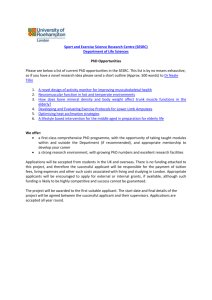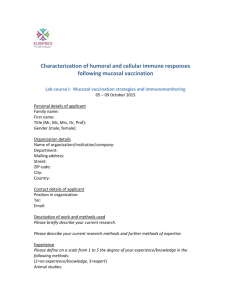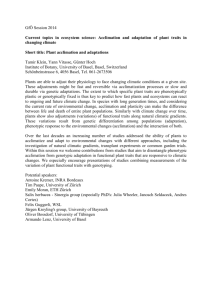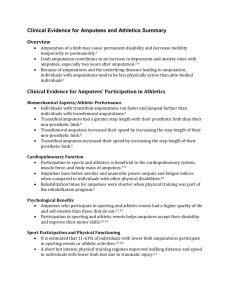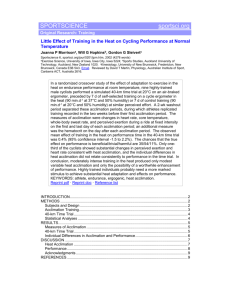PhD Opportunities in the Sport and Exercise Science Research Centre
advertisement
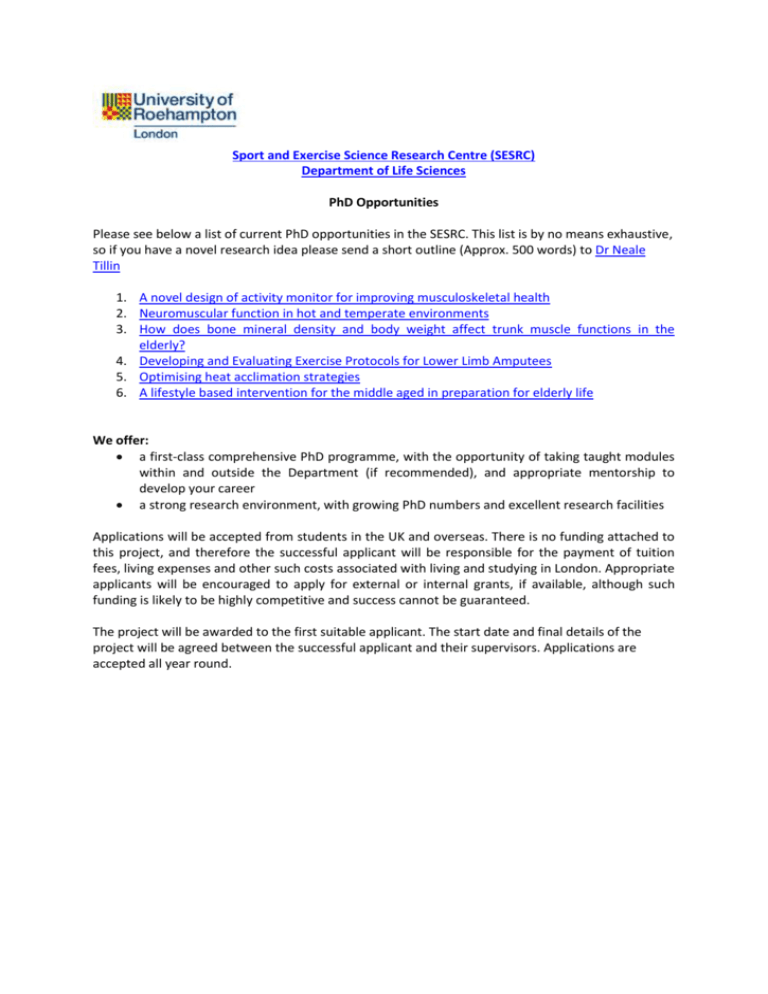
Sport and Exercise Science Research Centre (SESRC) Department of Life Sciences PhD Opportunities Please see below a list of current PhD opportunities in the SESRC. This list is by no means exhaustive, so if you have a novel research idea please send a short outline (Approx. 500 words) to Dr Neale Tillin 1. A novel design of activity monitor for improving musculoskeletal health 2. Neuromuscular function in hot and temperate environments 3. How does bone mineral density and body weight affect trunk muscle functions in the elderly? 4. Developing and Evaluating Exercise Protocols for Lower Limb Amputees 5. Optimising heat acclimation strategies 6. A lifestyle based intervention for the middle aged in preparation for elderly life We offer: a first-class comprehensive PhD programme, with the opportunity of taking taught modules within and outside the Department (if recommended), and appropriate mentorship to develop your career a strong research environment, with growing PhD numbers and excellent research facilities Applications will be accepted from students in the UK and overseas. There is no funding attached to this project, and therefore the successful applicant will be responsible for the payment of tuition fees, living expenses and other such costs associated with living and studying in London. Appropriate applicants will be encouraged to apply for external or internal grants, if available, although such funding is likely to be highly competitive and success cannot be guaranteed. The project will be awarded to the first suitable applicant. The start date and final details of the project will be agreed between the successful applicant and their supervisors. Applications are accepted all year round. Project title: A novel design of activity monitor for improving musculoskeletal health Background: Physical activity is important to maintain and improve the physical functions of bone and muscles. There are a number of commercially available activity monitors which are targeted at improving physical fitness, but none of them provide information about how they may be used to improve musculoskeletal health. There is also a need to develop a user interface which is attractive and user-friendly to the elderly people who will find this device helpful in preventing osteoporosis and loss of muscle function. Aim of project: The aim of this project is to develop a novel design which could provide user-friendly information about the effects of physical activity on musculoskeletal health, and to define parameters which could be set as exercise goals. Summary: This project will employ inertial sensors to measure the intensity of mechanical loadings associated with physical activity, and to study the effects of such loadings on the functions of the muscles and bones. The appropriate user interface will be developed. Potential supervisors: Dr Jin Luo (Tel: 0208 392 3000 ext. 4699; Email Jin.Luo@roehampton.ac.uk) If you are interested in the project, you are strongly encouraged to contact the above in the first instance. The successful applicant will have a Masters degree in biomechanics, biomedical engineering, mechanical engineering, mechatronics, product design or a related field, and should have knowledge and skills related to inertial sensors and computer programming. Return to start Project title: Neuromuscular function in hot and temperate environments Background: Prolonged maximal isometric contractions cause muscular fatigue – a reduction in maximal voluntary force production – which is often associated with reduced neural drive to the muscles. These reductions are more pronounced when core temperature is high, which may explain why the ability to exercise is decreased in hot, compared to moderate, environmental temperatures. Recent data from our laboratory have demonstrated that neck-cooling during exercise can increase running capacity and performance in the heat by allowing participants to tolerate higher thermoregulatory and cardiovascular strain before voluntarily terminating exercise at identical levels of perceived thermal comfort and exertion. Whether the improved exercise capacity and performance in hot conditions with neck-cooling can be attributed to an attenuated reduction in neural drive is unknown. It is also unclear how hyperthermia and neck cooling interventions may influence functionally relevant variables such as rate of force development. Aim of project: The proposed project will investigate the effect of hyperthermia with and without cooling on neuromuscular performance. The question will be addressed using a range of techniques to assess neuromuscular function in-vivo, including dynamometry, electromyography, electrical stimulation and ultrasonography, as well as using a range of thermoregulatory assessment procedures. Summary: Cooling the neck has been shown to improve exercise capacity in hyperthermic conditions, but the mechanisms of this effect are largely unknown. It is also unclear how hyperthermia and cooling affects explosive muscular performance (e.g., rate of force development). This PhD will investigate the effect of hyperthermia with and without cooling on neuromuscular performance. Potential supervisors: Dr Neale Tillin (Tel: 020 8 392 3542; Email: neale.tillin@roehampton.ac.uk) Dr Chris Tyler (Tel: 020 8 392 3861; Email: chris.tyler@roehampton.ac.uk) If you are interested in the project, you are strongly encouraged to contact the above in the first instance. The successful applicant will have a Masters degree in Sport and Exercise Science, Physiology or a related area. Knowledge of neuromuscular and thermoregulatory physiology and assessment would be advantageous. Return to start Project title: How does bone mineral density and body weight affect trunk muscle functions in the elderly? Background: Osteoporosis and obesity are two related public health issues in the elderly. Both may lead to changes in postures and the structures of the muscles. However, it is unclear how they may affect muscle functions, in particular the muscles of the trunk. This is clinically important as muscle functions could affect the risk of vertebral fractures, mobility performance and subsequently the quality of life. The knowledge acquired in this study will help us develop effective interventions and preventive strategies of osteoporosis and obesity. Aim of project: This project will examine how bone mineral density and body weight may affect trunk posture and muscle functions, including muscle strength and performance of the muscles during everyday activities. Summary: The project will employ biomechanical tools (e.g. inertial sensors, electromyography) and ultrasound images to study muscle functions, posture and mobility in elderly people, in the presence and absence of osteoporosis and obesity. Potential supervisors: Dr Jin Luo (Tel: 0208 392 3000 ext. 4699; Email: Jin.Luo@roehampton.ac.uk) If you are interested in the project, you are strongly encouraged to contact the above in the first instance. The successful applicant will have a Masters degree in biomechanics, biomedical engineering, mechanical engineering, clinical science, allied health professions, or a related field, and should have knowledge and skills in using biomechanical tools to analyse human movement and muscle function. It is desirable that the applicant has previous research experience in the area of ageing. Return to start Project title: Developing and Evaluating Exercise Protocols for Lower Limb Amputees Background: Amputees are encouraged to exercise in order to gain from the associated physiological, psychosocial and mechanical benefits. However, when exercising higher demands are placed on the musculoskeletal system than those experienced in walking, the movement which is the focus for amputee rehabilitation. Consequently, it is possible that participation in exercise may cause both short-term and long-term damage to the musculoskeletal system. There is a paucity of research related to exercise guidelines for amputees and consequently, amputees may not be taught the skills required to safely participate. Aims of project: The first aim of this research is to determine the biomechanical demands placed on the musculoskeletal system during different movements associated with exercising, such as running, jumping and rapidly changing direction for experienced amputees. The second aim of the research is to develop and evaluate an exercise programme which can be used by amputees new to exercise, to prepare them for the involved physiological and biomechanical demands. Summary: Initially, the research will be conducted on experienced amputees to develop our understanding of the compensatory mechanisms and loading patterns demonstrated by amputees when engaged in dynamic activities. Thereafter, these mechanisms will be used to inform the development of an exercise programme which can enable amputees who are new to exercise to prepare for these dynamic activities, and to minimise any short and long-term damage which may result for rapid and high loading patterns. The effectiveness of the exercise programme will be evaluated. The research project will use motion capture systems (Vicon, Kistler Force Plate, EMG) to determine the joint kinematics and kinetics adopted. Potential supervisors: Dr Siobhán Strike (Tel: 0208 392 3546; Email: s.strike@roehampton.ac.uk) Dr Ceri Diss (Tel: 0208 392 3535; Email: c.diss@roehampton.ac.uk) If you are interested in the project, you are strongly encouraged to contact the above in the first instance. The successful applicant will have an MSc degree in Sport and/or Exercise Science, Physiotherapy, Prosthetics and Orthotics, Bioengineering or a related area. They will have a good understanding of biomechanics and human motion, excellent data-handling skills and excellent inter-personal skills. Return to start Project title: Optimising heat acclimation strategies Background: Exercise performance and capacity are impaired in hot conditions and as a result a number of strategies designed to minimise this impairment are commonly adopted by athletes. One such strategy is heat acclimation- a process whereby the athlete is routinely exposed to hot conditions to induce beneficial physiological, biochemical and perceptual adaptations. Despite the well-documented use of heat acclimation and acclimatisation (e.g. warm-weather training camps) the optimal heat acclimation approach is unknown and very little is known about the rate at which heat acclimation decays. Aim of project: The proposed project will investigate the effect of different heat acclimation protocols on performance benefits; physiological, biochemical and perceptual adaptations and the retention of these adaptations. Summary: Despite the routine use of heat acclimation by athletes prior to competing in hot conditions very little is known with regards to the optimal heat acclimation approach (es). This PhD will attempt to identify optimal heat acclimation protocols for subsequent performance. Potential supervisors: Dr Chris Tyler (Tel: 020 8 392 3861; Email: chris.tyler@roehampton.ac.uk) If you are interested in the project, you are strongly encouraged to contact the above in the first instance. The successful applicant will have a Masters degree in Sport and Exercise Science, Physiology or a related area. Knowledge of thermoregulatory physiology and assessment would be advantageous. Return to start
